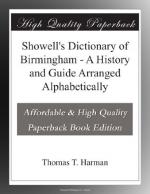14 years and
Under 14
over. years.
Total.
Church of England
schools 5,500 16,500
22,000
Sunday School
Union 7,312 13,660
20,972
Wesleyan and others 2,745 6,627
9,372 Roman Catholic 1,200 1,950
3,150 Unitarian 692
1,359 1,961 Other schools 550
750 1,250
------- -------
-------
17,859 40,846
58,705
Wesleyan College.—The five memorial stones of a College for training Wesleyan ministers, at the corner of Priory and College Roads, Handsworth, were laid June 8, 1880. The site includes 17-1/2 acres, and cost over L7,000, the total cost of the College when completed and furnished being estimated at L40,000. About fifty students are accommodated at present, but there is room for thirty more.
Scraps of Local History.—A foreign visitor here in the reign of James II., wrote that our tradesmen were in the habit of spending their evenings in public-houses, and were getting into lazy habits, so that their shops were often not opened before 7 a.m.
Another intelligent foreigner (temp Charles II.) has left it on record that not only was smoking common among women here, but that the lads took a pipe and tobacco with them to school, instead of breakfast, the schoolmaster teaching them at the proper hour how to hold their pipes and puff genteelly.
Hutton believed that the scythe-blades attached to the wheels of Queen Boadicea’s war chariots (A.D. 61), as well as the Britons’ swords, were made in this neighbourhood.
When escaping from Boscobel, in the guise of Miss Lane’s servant, Charles II. had to appeal to a blacksmith at Erdington to re-shoe his horse. The knight of the hammer was a republican, and his majesty chimed in with the man’s views so readily, that the latter complimented his customer on “speaking like an honest man.” Miss Lane afterwards married Sir Clement Fisher, of Packington, and her portrait may be still seen at the Hall.




